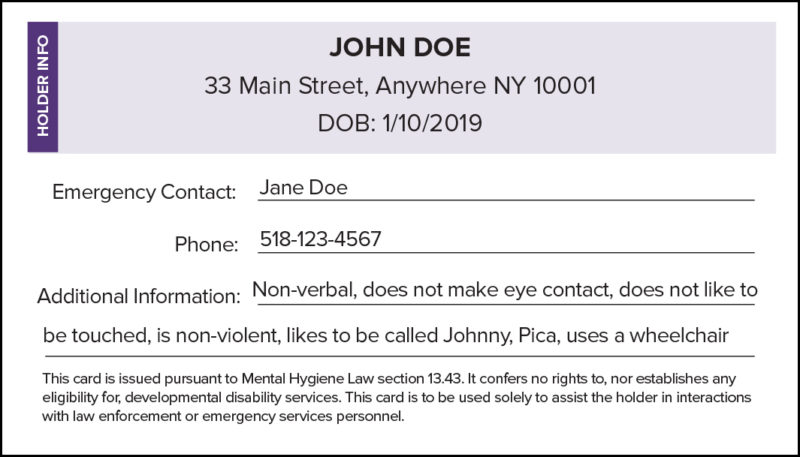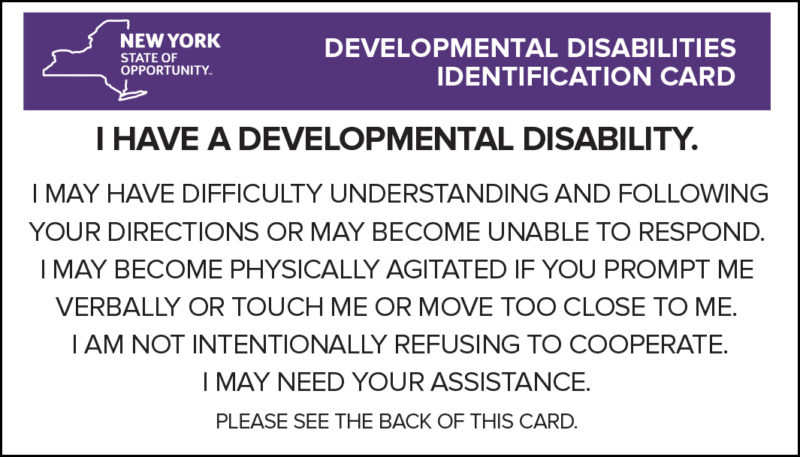By now, some of you may have heard about OPWDD’s (Office for People with Developmental Disabilities) new I/DD ID cards for individuals with intellectual developmental disabilities in New York State. These standardized cards are available upon request and can be a very useful tool in bridging the gap of communication and reducing possible risks that may present themselves when individuals with autism and other developmental disabilities are in situations involving law enforcement or other first responders. Interactions with law enforcement and emergency personal is an especially concerning topic as children with autism grow up and become adults with autism.


I wanted to take a moment to follow up and provide some additional information as well as to let people know of some exciting new initiatives NSSA has been involved with related to these cards. Finally, I would like to provide a link to OPWDD’s website in order for individuals or families of individuals with autism or other developmental disabilities to obtain the ID card: opwdd.ny.gov/iddidcards. Regardless of where an individual profile falls on the autism spectrum, I highly encourage families of individuals with autism or other intellectual disabilities in New York State to take the opportunity to get one of these cards.
First, I will provide some background information. According to OPWDD, the goal of this I/DD ID card initiative is to help first responders such as law enforcement, firefighters and other emergency personnel better understand and interact with people with developmental disabilities who may not be able to communicate their situation effectively. This new legislation was signed into law by New York State Governor Cuomo in 2018 and grew out of legislation sponsored by NY State Sen. Pamela Helming, R-Canandaigua, and Assemblyman Angelo Santabarbara, D-Schenectady. The legislation was inspired by Assemblymen Santabarbara who has a son with Autism.
So far, there has been a positive response to the cards and there have been many requests for them. According to OPWDD, more than 7,000 cards were requested in the two months since they became available. Although this has resulted in a delay, it shows the potential value that these cards have for individuals and their families. Of course, there will always be critics and no system or plan will necessarily be perfect but for many reasons, these cards have the potential to ease tension in emergency situation, bridge the gap of communication, and possibly avoid truly tragic outcomes during difficult scenarios.
Some of the ways these new I/DD ID cards may be beneficial include:
- They can possibly reduce the risks associated with law enforcement interactions given the communication and behavioral differences and how they may appear or be misinterpreted by others, such as stereotypic behavior like rocking, vocalizing, abrupt physical movement, walking away, not maintaining eye contact, etc.
- They can provide needed information for someone that may be nonverbal or have limited verbal communication skills or ability
- They can potentially prevent tragedies in very intense situations
- They can provide critical information for first responders in an emergency, especially if the parent is not there or not able to communicate on their behalf
- They can help in cases of wandering (also referred to as elopement)
- Information on the front of the card is general but information on the back can be individualized to the person which is extremely important
- Individuals can be taught to carry these cards and present them upon request or if they are in need of help or assistance
- The OPWDD IDD/ID cards are standardized and uniform across the state which helps emergency personnel become familiar with them during trainings and interactions in the community

NSSA’s Jason Watson, Director of Community Engagement providing information on Autism, Applied Behavior Analysis, OPWDD and the newly introduced identification cards to Town Of Hempstead Town Clerk Sylvia Cabana and her staff
In recent weeks, I have had the opportunity to collaborate with Town of Hempstead, NY, Town Clerk, Sylvia Cabana and Deputy Town Clerk Dolores Sedacca. They were eager to figure out a way to get information to families as well as to possibly have Town of Hempstead staff assist families and individuals right there in the main town office. Together we discussed the OPWDD I/DD ID cards as well as ways to get the information to individuals and families that may benefit from the cards. After our initial meeting, we set up an NSSA Community Information Session so that I would be able to come to the main Town of Hempstead building to meet with key staff from the clerk’s office. During this meeting, I introduced those in attendance to NSSA, autism spectrum disorder, applied behavior analysis, OPWDD and of course these new I/DD ID cards. In addition to these topics, we discussed tips for understanding and working with individuals with autism as well as their families. I also provided them with a detailed task analysis that could be used by the clerk’s office staff or anyone that wanted to complete the process for getting the ID card.
The Town Clerk’s office provides assistance for many things including passport ID processing and providing senior ID cards. Now, they will also include assistance for completing the process in order to obtain the OPWDD I/DD ID card. They will have designated staff to assist as needed as well as designated areas of the office with added privacy and support if needed. The staff will now be knowledgeable about ASD, OPWDD, and the ID cards. Most importantly they will have a sensitivity and understanding to the challenges many individuals with autism and their families face on a daily basis. It was great meeting with Town Clerk Sylvia Cabana and her dedicated staff. I applaud their effort and determination in leading the way on autism acceptance and inclusion in the Town of Hempstead and I look forward to additional opportunities to provide these valuable information sessions to other local government offices, community organizations, and other interested members of the community.
Jason K. Watson, BCaBA, CBAA, is Director of Community Engagement at Nassau Suffolk Services for Autism. For more information on obtaining an OPWDD I/DD ID card, visit the OPWDD website at opwdd.ny.gov/iddidcards, Nassau Suffolk Services for Autism’s website at www.nssa.net, or contact the Town of Hempstead Clerk’s office.



